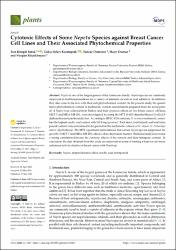Cytotoxic effects of some nepeta species against breast cancer cell lines and their associated phytochemical properties

View/
Access
info:eu-repo/semantics/openAccessAttribution 3.0 United Stateshttp://creativecommons.org/licenses/by/3.0/us/Date
2022Metadata
Show full item recordAbstract
Nepeta is one of the largest genera of the Lamiaceae family. Nepeta species are commonly
employed in traditional medicine for a variety of ailments, as well as food additives. In addition,
they also come to the fore with their rich phytochemical content. In the present study, the quantitative phytochemical content of methanolic extracts and infusions prepared from the aerial parts
of 14 Nepeta taxa collected from Turkey and their cytotoxic effects on two breast cancer cell lines,
MCF-7 and MDA-MB-231, were investigated by using the MTT (3-(4,5-dimethylthiazol-2-yl))-2,5-
diphenyltetrazolium-bromide) test. According to HPLC-PDA analysis, N. racemosa methanolic extract
had the highest ursolic acid content with 165.9 mg/g extract. Total sterol, total iridoid, and total triterpenoid content were determined to be greatest in the methanolic extracts of N. meyeri, N. trichocalyx
and N. phyllochlamys. The MTT experiment demonstrated that certain Nepeta species suppressed the
growth of MCF-7 and MDA-MB-231 cells in a dose-dependent manner. Statistical analysis revealed
a strong correlation between the cytotoxic effects of the extracts and their triterpene content. In
conclusion, the data obtained from this study are important in terms of forming a basis for advanced
anticancer activity studies on breast cancer with Nepeta sp.
Source
Plants-BaselVolume
11Issue
11Collections
The following license files are associated with this item:


















